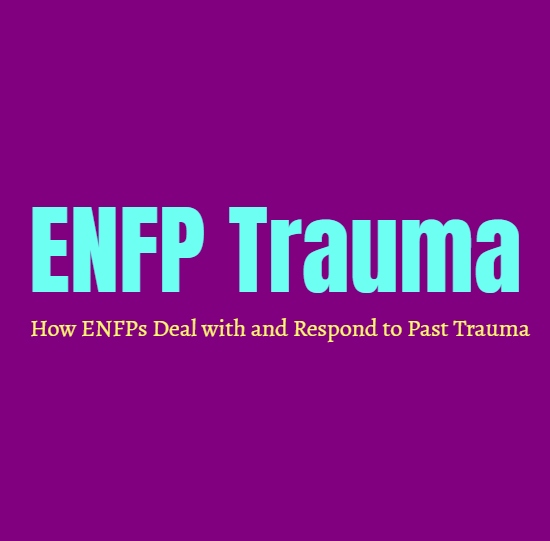ENFP Trauma: How ENFPs Deal with and Respond to Past Trauma
When it comes to experiencing trauma, everyone has their own ways of handling and coping with what they go through. Of course, it often requires certain help from others, and serious trauma can also require therapy to find tools and ways to move through it. There are so many different types of trauma. Some happen so subtly that we don’t even realize we have endured a truly traumatic experience. It can be difficult to process, especially when you are still involved in the trauma which is bringing you down. This is something that can affect someone’s behavior long-term and make certain personality types behave in ways that don’t seem to really fit who they normally are. This is why it is important to understand the different ways that trauma can change someone or alter their behavior.
ENFPs often strive to understand themselves and their own inner emotions, which is something that can aid them in the healing process. The ENFP who does take the time to process their emotions and work through this trauma is likely to find healthier means of coping and even use creative outlets. Not everyone is capable of maturing into their best selves so quickly, though, and so some ENFPs can certainly struggle when it comes to dealing with their trauma. They might attempt to find distractions or anything which can help them avoid that struggle they are not currently coping with. It can be hard to fully process something if it happened at a young age or if the trauma seems like something which might not ordinarily affect this person.
ENFP Childhood Trauma
If the ENFP has endured some sort of childhood trauma, this can cause them to adopt a more cynical mindset. They might struggle to trust people and can look at them with a sense of suspicion. The ENFP, who is normally outgoing and loves being around people, might have a hard time ever letting someone get genuinely close to them. This might cause them to struggle to see themselves as successful, feeling as if they can’t ever reach the type of accomplishment they require. This is often because the ENFP is not fully processing that trauma or abuse, making it hard for them to feel a sense of personal accomplishment even when they have done something truly impressive. Without fully processing the PTSD, it can only continue to become more challenging for the ENFP over time, so seeking professional help is often necessary. ENFPs feel things very deeply, and so they need to be able to understand and work through those emotions in order to truly heal and move forward. At their best, the ENFP is sensitive and understanding, and capable of seeing the good in the world around them. Having endured trauma can cause them to view things with a more cynical viewpoint, which is not naturally the way they would want to approach things. Childhood trauma can also cause the ENFP to withdraw at a young age when ordinarily, they would be outgoing and charming.
How Trauma Changes The ENFP
ENFPs are normally bubbly and outgoing people, but post-trauma, they can show signs of being more withdrawn. They might go through periods of being rather stuck in the past, struggling to get over certain mistakes or awkward situations. The ENFP might run these things over in their minds and obsess over details they would typically move on from. They might go through periods of wanting to be away from others, diving into their own thoughts and feelings for long periods of time. They likely shift from this to being caught up in new experiences and wanting to bounce around to something new and exciting. The distractions can help the ENFP to keep themselves from focusing on those negative emotions which are weighing them down. When they don’t want to dive into the trauma and deal with it, sometimes surroundings themselves with other people and new challenges can keep their thoughts busy enough. While ENFPs naturally want to express themselves and reach a deep sense of understanding for who they are, trauma can set them back and make this difficult. The ENFP who has endured serious trauma can sometimes struggle to develop that sense of personal understanding and instead might struggle to process negative emotions and only focus on the positive.
ENFP Coping with Trauma
ENFPs coping with trauma often benefit from having people to share their experiences with. People who are like-minded and have experienced something similar really give the ENFP a sense of comfort and peace of mind. They are social creatures by nature and need to be able to express themselves to others and find ways to feel understood. Having people who have been through similar things, especially other ENFPs, will make the process of healing much easier for the ENFP. While some time alone to reflect is beneficial, spending too much time by themselves can make the situation worse. The ENFP needs to have some sort of outlet and really does better connecting with other people. Feeling a sense of understanding and compassion makes it easier for them to process their emotions instead of feeling shame for them. Having a safe space to really open up and express themselves is one of the best things for the ENFP trying to cope with their trauma and find a way to move forward. They need to accept their feelings about the past and not blame themselves for any mistakes along the way. One of the important steps for the ENFP to heal is to forgive themselves for their behavior during times when their trauma had triggered them. Being gentle on themselves is definitely important for the ENFP to be able to process those feelings and move forward.
This Post is Brought To You By BetterHelp
